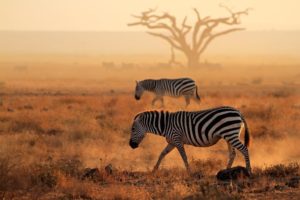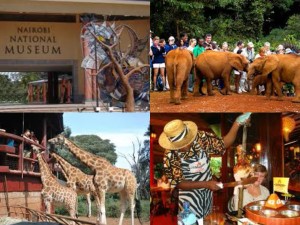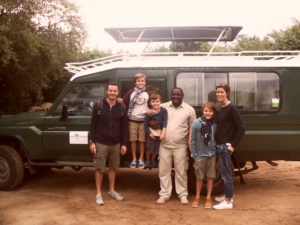Kenya weather and climate
Deciding when to go to Kenya is a perennial question for visitors. There’s no simple ‘best time to visit Kenya’ as good conditions vary across the country, and one person’s ideal weather will be another’s disappointment. But because Kenya is located at the equator, most of the time it’s hot and sunny… Having said that, most visitors will find something positive about the weather through most of the year. Whatever the ambient temperature in the shade, when the sun is out – which is a good deal of the time, and often from dawn until dusk for weeks on end.
The great migration
Many travellers visit Kenya to see the great wildebeest migration in the Maasai Mara. Linked to annual rainfall patterns and the growth of new grass, this remarkable migration of hundreds of thousands of wildebeest and zebra is a constant movement of huge, nomadic herds. In Tanzania, it can be seen from November to June: you just need to know where to look. The migrating herds enter Kenya as from July until October – though recent years have seen major arrivals as early as June, and late-stayers still in the Maasai Mara region until November or even later.
Passport and Visas
A valid passport is required. It is advisable to seek information from our Mission in your respective country. Visas are required by all. They can be obtained at the Kenya High Commission in your country of residence or alternatively on arrival in Nairobi or Mombasa airport. Kenya Visas are also obligatory and can be obtained on arrival also.
Cost of each visa is US$ 50 – per passport
Health and Immunization
A course of anti-malarial tablets is essential, seek advice from a GP. A mosquito repellent is also advisable. If on medication, it is best to take a supply of medicines to last the entire trip.
Currency
The Kenyan currency is denominated in notes and coins as follows: 1000/- note, 500/- note, 200/- note, 100/- note, 50/- note, 40/- coin, 20/- coin, 10/- coin, 5 /- coin, 1/- coin and 50 cent coin. US dollars are acceptable but it is advisable to have local currency on you. There are several bureau de change (Foreign exchange) at the airport and in the city.
A commission is levied for changing of the foreign currency. However, most of the Banks and establishments including Ultimate Africa Expeditions will not accept US Dollar bills printed before the year 2006.
Customs
Visitors may import, duty-free, 200 cigarettes or 50 cigars, and one litre of spirit.
Baggage Claim
All bags arrive on the conveyor belt. Each person picks his/her bag, onto a trolley and then clear Customs – where he/she presents their passport. This is just a formality – nothing more than that. And immediately in front of them are the Exit doors to the Public Waiting Area/ Rendez-vous point.
Meeting Point on arrival
Once you clear immigration and customs – our representatives will meet you on arrival entry outside the Customs Hall.
The common name on the MEETING board will read the name of the client/group.
Telecommunication
Auto roaming of mobile phones is available in Kenya, Tanzania, Uganda and Rwanda with excellent network in the cities and in and around some of the national parks and reserves. This will however depend on whether there is a reciprocative agreement with your country. Otherwise, most lodges/hotels are connected to land lines. There is a cost for usage of the phones.
You may also buy a Pre-Paid line from Airtel or Safaricom (with easy switch over from Kenya to Tanzania), whilst on holiday here. This is the cheapest option.
Flying Doctors
The temporary membership cost is US$ 15.- per person and is valid for a 3 months visit in East Africa.
It entitles the subscriber to one free ‘evacuation’ flight from a radius of 1000 km within East Africa.
The areas we are going to fall within this range of mileage. The evacuation flight consists; depending on the emergency, a nurse, a doctor, flight attendant and of course the crew. The aircrafts are equipped with Blood, Oxygen etc.
So if we had an accident or somebody fell ill, we could call upon the Flying Doctors and within a turn-around time of maximum 40 minutes to one hour, they would be at the nearest airstrip to our location.
Website: www.flyingdoctorsocietyafrica.com
What to Carry
Baggage: TRAVEL LIGHT!
Clients should be encouraged to carry soft bags as opposed to hard/roller cases such as Samsonite etc..
This saves time during the loading/off-loading of the safari vehicles.
Other Personal Items
Don’t forget the camera, camcorder and a plentiful supply of film and spare batteries.
A pair of binoculars will greatly enhance game viewing while a torch to find your way around camp after dark is a good idea. Books, pencils, crayons and crackers are very welcome as gifts to the children of local villages that you would pass (or visit) whilst on safari.
What to wear
Summer clothing is worn throughout the year, although at times a jacket and light raincoat may be necessary.
On dawn and dusk safaris, a sweater is likely to be needed. On safari, wear neutral colours, such as brown, beige and khaki – bright colours may alarm the animals. Sensible walking shoes are also recommended. Since laundry is only possible where you are staying for 2 nights, try to carry quick-dry type of clothing. Casual wear is the norm during the day, a short-sleeved shirt for men, light cotton dresses, or a skirt and top for women. In the evening, all hotels and restaurants require long trousers for men in particular. Sunglasses and a hat for protection against the sun are recommended and swimsuits should be packed for the swimming pool or beach. Topless sunbathing is not permitted.
Tipping
Obviously a tip is not obligatory and it fully depends on the level of your satisfaction, but even a small amount to show your gratitude will be highly appreciated. Tipping is customary and in many occasions, actually ‘paves the way’. It is indeed a way of life. Please note that there are variations between Kenya and Tanzania on tipping and gratuities.
Whilst the actual amount of money to tip is left at your discretion, we would like to offer some guidelines here below:
KENYA
| Porter (per bag) | US$ 1 each time |
| Server in restaurant (per meal) | US$ 1.50 per person |
| Driver-guide (per day) | US$ 10 per person |
On average, we would recommend that you budget for US$ 70 – 100. per person on a trip of 7-10 days, which would comfortably cover all tipping & gratuities
Shopping
There is a big variety of souvenirs to take home. Most hotels have licensed souvenir shops and there are a large number of such outlets in the main towns. Popular items are wood carvings, African art, African clothing, soap stone carvings, wax batiks, tie and dyes, African jewelry, gem stones. The various Cultural Heritage Centre stocks a wide range of African crafts. As you move along from point to point, you will come across many souvenir shops “kiosks” , if you like something, BARGAIN and BUY. At several places, barter is also possible. You may want to bring your used T-shirts, caps, sneakers etc.. and in exchange pick up Masai bead bracelets, small animal carvings etc.. As your time can be limited, don’t put off your shopping till the ‘last day’. Often some of these ‘kiosks’ may stock items that are not available in the city. The traders accept all major currencies in cash and some of the bigger outlets also take International Credit Cards. If you like, you may also visit the gold smiths where there is a wide range of beautiful jewelry made from gold, silver and diamond. Latest in African Fashion is available at select outlets.



